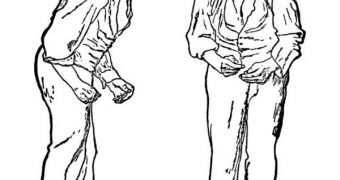Investigators attending a conference yesterday heard a new theory on the causes that lead to the development of Parkinson's disease. A team of scientists proposes that the condition may be at least partially caused by a type of bacteria known to be responsible for stomach cancer and ulcers.
The new study indicates that the microorganism Helicobacter pylori may play a role in causing the neuromotor degradation that accompanied this neural disorder. The bacteria infects about half the people on the planet, more than 3 billion individuals.
This announcement was made Sunday, May 22, at a meeting of the American Society for Microbiology (ASM). These conclusions are very important, since nearly 60,000 new cases of the disorder are diagnosed annually, in the United States alone.
Patients who suffer from this condition exhibit a significant decrease in the number of dopamine-producing cells in their brains. As such, they begin to find it more and more difficult to control their movements. In the end, this leads to the appearance of the shaking that characterizes the disorder.
In past investigations, researchers established that people who suffer from Parkinson's had a higher likelihood to have suffered ulcers at some point in their lives, and so researchers naturally wondered whether the cause of ulcer – H. pylori – may be related to the neural condition.
Researches conducted in this direction until now have provided only circumstantial evidence, but the new work is the first ever to provide more than that. The new study is not meant to prove that H. pylori is the only reason Parkinson's appears.
In short, it could be that this type of bacteria is one of many causes that accumulate to underlie the disease. The new study was led by experts at the Louisiana State University Health Sciences Center in Shreveport.
The research team, coordinated by microbiologist Traci Testerman, conducted a series of studies on mice models. The work revealed that H. pylori-infected mice were more likely to display reduced amounts of dopamine in the area of the brain controlling movements.
According to the research team, the same correlation held true even when the mice were fed H. pylori cultures that were killed first. As such, it could be that the thing leading to reduced dopamine amounts is not the bacteria themselves, but rather some of the chemicals they contain.
“There’s enough solid data that it would be wrong not to look into it more closely,” Maloy concludes, quotes by Science News.

 14 DAY TRIAL //
14 DAY TRIAL //